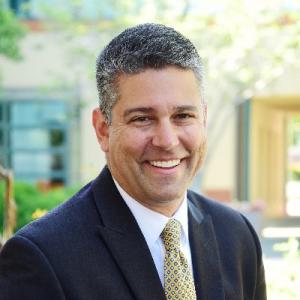
 Jason Curtis, Ed.D. is the president of St. Francis High School in Mountain View, California. St. Francis High School is a private, co-ed Catholic school with more than 1,700 students. Jason has more than 25 years of experience in Catholic education. He spoke at the National Catholic Education Association annual convention this past April and Track it Forward was in attendance. We found his presentation on parent engagement compelling and created this recap to share with anyone who might have missed it. This recap is designed to highlight the key takeaways from the presentation and does not necessarily cover all content shared during the session.
Jason Curtis, Ed.D. is the president of St. Francis High School in Mountain View, California. St. Francis High School is a private, co-ed Catholic school with more than 1,700 students. Jason has more than 25 years of experience in Catholic education. He spoke at the National Catholic Education Association annual convention this past April and Track it Forward was in attendance. We found his presentation on parent engagement compelling and created this recap to share with anyone who might have missed it. This recap is designed to highlight the key takeaways from the presentation and does not necessarily cover all content shared during the session.
Jason’s session was held on April 12, 2023 at the NCEA convention in Dallas, Texas. It was titled A New Model for Parent Engagement in Catholic Schools, and we’ve included the official abstract below:
Parent engagement is the key to strong Catholic schools. We will be sharing a new and proven model of parent engagement that encourages parent involvement, increases volunteerism, offers parent leadership opportunities and actively engages parents in the mission of Catholic schools. Participants will discuss challenges and obstacles to parent engagement and will learn ways to mentor parents to both an authentic partnership with schools and engagement resulting in inspirational parent formation.
Jason opened the session by welcoming attendees in and enthusiastically waving in anyone who was late. He encouraged attendees to talk to each other and try to get to know each other. He emphasized the importance of creating a welcoming and engaging environment like this one for parents at your school.
What is Parent Engagement and Why is it Important?
Most schools want to engage parents in some way but don’t always know how. Parent engagement is important because it contributes to the strength of your school and to student learning. In addition, parent engagement creates a good model for students and helps to build community for schools, parents, and students.
It’s important to create a parent engagement strategy that focuses on all parents. Jason shares that many schools only focus on some of the parents. He gives the example that if 10% of the parents are team players, another 10% you are trying to get to be team players, then the other 80% are simply ignored. Think about how you can engage all parents by giving them something to do.
“Parents are like coffee,” Jason said. They are essential, and yet there is a whole process to get them engaged. Parent engagement happens in stages. First, you need parents to show up and be present. This stage is participation. Second, you need parents to get involved. At this stage, they are invested. And finally, you want parents to be engaged. This last stage is where the transformation happens.
How to Engage Parents
Jason uses the Hands, Head, and Heart model when it comes to engaging parents. He notes that many groups engage in this model of participation, especially volunteers. If your school only focuses on the Head, for example, then you’re likely only reaching a third of the whole group.
Some people want to be hands-on and get the work done. Others want to plan and organize. And still others want to participate in the community and social aspect. Jason encourages schools to find the opportunities that appeal most to their specific parent volunteers. Creating a group of mentors and friends can help get parents engaged.
Jason said he often hears that parents don’t want to do things, but he insists they do! Parents do the things that are important to them, so you need to meet them where they’re at, like student sporting events. To get parents engaged, you also need to change your expectations of volunteers. Go beyond the typical idea of work. Maybe volunteers can be greeters at school events and engage with other families and ask for feedback.
By implementing this model, Jason’s school was able to increase the number of parent volunteers year over year. An important piece of this is accepting all volunteers! Create roles and jobs for any parents who want to participate. Let the volunteers take the lead. The role of management in this case is to organize volunteers, but to let volunteers participate in what interests them most.
Communicating with Parents
Jason said schools need to think about how they talk to parents. Schools are likely sending a huge amount of communication - what is the message? They might be asking for funds or volunteer hours, but how much of that gets through? Communications might not be working if they don’t meet parents where they’re at. Are parents also being thanked for their help? This meets the need for Heart by showing parents they are valued and appreciated. It’s important not to just tell parents what they want to hear, but what they need to hear.
Jason concludes by sharing that the most important thing is to love your parent volunteers! Make them feel welcome and included. Meet them where they’re at. Create volunteer opportunities that they are interested in, meeting the needs of the Hands, Head, and Heart.
Session Questions
There were several thought-provoking questions raised throughout this session and we’ve included some of them below.
- How do we find volunteers who are the right fit?
- How do you have hard conversations with parents who are not the right fit for a role?
- What does good parent engagement transformation look like?
We hope you enjoyed this recap of the NCEA annual convention session, A New Model for Parent Engagement in Catholic Schools. If you’re looking for more great content about parent involvement in schools, sign up for the Track it Forward Parent Engagement Newsletter!
 Written by
Written by